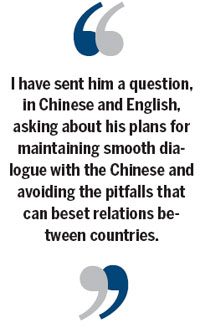Cameron scores big in media sphere
Updated: 2013-12-06 10:02
By Fu Jing (China Daily Europe)
|
|||||||||||
Foreign Politicians need to learn to talk to the Chinese in their language
When British Prime Minister David Cameron returned to London from his trip to China, he might well be surprised not only by the dozens of business contracts signed but also by the long list of questions put to him by his new Chinese followers gained as the result of a micro blog.
I have long observed how foreign politicians engage their Chinese followers, sometimes in the millions, in the social media sphere. First thing each day their public relations teams upload schedules, speeches and tidbits in English and other languages. However, for want of anything in Chinese, these monologues, as well meaning as they may be, fail to hit the target.
So I have regretfully concluded that all these efforts by foreign politicians to try to engage the Chinese man and woman in the street are abject failures. However, Cameron's team has made a difference with its belated use of weibo, or micro blog, a Twitter like social media, in Chinese.

By Dec 5, Cameron had uploaded nine postings since he started to use the tool one week ago, three of which had been posted as warm-up messages before he arrived in China.
Chinese was used in all postings, and two were bilingual.
In content the postings were all simple and original, and illustrated with photos. They were not simply official documents, schedules and speeches. Not shy of advertising, Cameron even published two postings on Land Rover in a marketing effort for the British car maker aimed at China's new rich.
What has been most intriguing has been his team's efforts to set up a dialogue with the public. In one of Cameron's latest postings he asked his followers to leave questions for him, which he said he would answer before leaving China.
Through all these simple but effective methods, the number of Cameron's micro blog followers surpassed 200,000 in one week.
As impressive as that may be, European Council President Herman Van Rompuy, who opened a weibo account in 2011, has more than three million followers in China. Christine Lagarde, managing director of the International Monetary Fund, has more than 3.5 million weibo followers. The number is surprisingly high, given that Lagarde's messages are never in anything other than English and French.
Christiana Figueres, climate change chief of the United Nations, also has opened a weibo account and has a modest 45,000 followers. But she and her minders barely utter a word in Chinese when discussing climate change.
What should delight Cameron most is the active responses from his followers. One of his latest postings had been forwarded and commented on more than 20,000 times, a number you would think would be difficult to achieve using the most well-known Western social media tools, Facebook and Twitter.
Van Rompuy had no such luck when he was in Beijing for the China-EU summit in November. His team published several postings about his meetings with Chinese leaders but none was forwarded more than 10 times.

Van Rompuy has made some progress by posting several short notices and comments in Chinese in the social media sphere, though the the number of responses is still low, particularly taking into account the number of followers he has.
In one of his latest postings, Van Rompuy welcomed Cameron's visit to China, urging him to follow suit by making friends with Chinese keen on building closer EU-China relations by using social media.
Van Rompuy is right in encouraging European leaders to invest time and energy in building their relationships with ordinary Chinese.
But he and other politicians need to follow Cameron's suit. Social media are open, fast and interactive, and what politicians and their media teams should bear in mind is that they must obey the journalistic rule that content is king.
Furthermore, to demonstrate that they respect their audience they must talk to them in their language. That means taking a leaf out of Cameron's book.
I have become a Cameron follower because of his team's professional way of using social media in dealing with China.
I have sent him a question, in Chinese and English, asking about his plans for maintaining smooth dialogue with the Chinese and avoiding the pitfalls that can beset relations between countries.
Receiving an answer will prove that the interactive function of social media really does work.
The author is chief correspondent of China Daily based in Brussels. Contact the writer at fujing@chinadaily.com.cn.
(China Daily European Weekly 12/06/2013 page12)
Today's Top News
Chinese-French voters seek louder voice
Trade surplus hit record high in Nov
Japan's secrets law raises fears
China allows rouble in border city
Gaokao reform removes English
'Two-child' rules to go from 2014
Institute keen to spread word
Cameron answers questions on Weibo
Hot Topics
Lunar probe , China growth forecasts, Emission rules get tougher, China seen through 'colored lens', International board,
Editor's Picks

|

|

|

|

|

|





